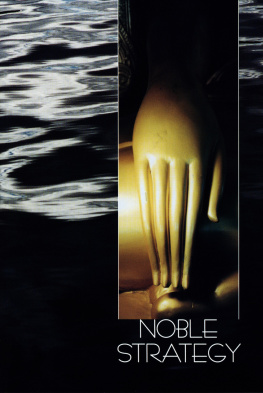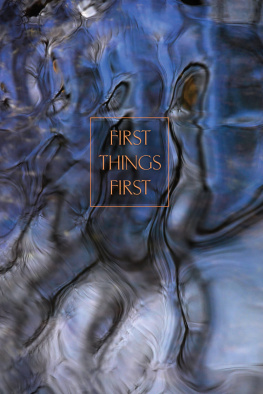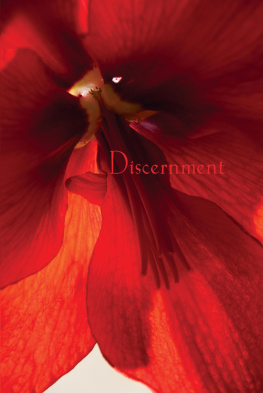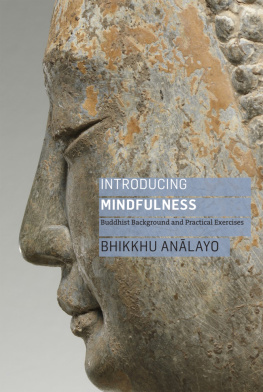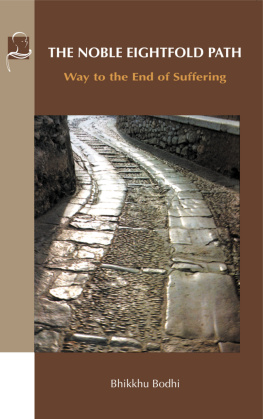Thanissaro Bhikkhu - Noble Strategy: Essays on the Buddhist Path
Here you can read online Thanissaro Bhikkhu - Noble Strategy: Essays on the Buddhist Path full text of the book (entire story) in english for free. Download pdf and epub, get meaning, cover and reviews about this ebook. year: 1999, publisher: Metta Forest Monastery, genre: Religion. Description of the work, (preface) as well as reviews are available. Best literature library LitArk.com created for fans of good reading and offers a wide selection of genres:
Romance novel
Science fiction
Adventure
Detective
Science
History
Home and family
Prose
Art
Politics
Computer
Non-fiction
Religion
Business
Children
Humor
Choose a favorite category and find really read worthwhile books. Enjoy immersion in the world of imagination, feel the emotions of the characters or learn something new for yourself, make an fascinating discovery.
- Book:Noble Strategy: Essays on the Buddhist Path
- Author:
- Publisher:Metta Forest Monastery
- Genre:
- Year:1999
- Rating:4 / 5
- Favourites:Add to favourites
- Your mark:
- 80
- 1
- 2
- 3
- 4
- 5
Noble Strategy: Essays on the Buddhist Path: summary, description and annotation
We offer to read an annotation, description, summary or preface (depends on what the author of the book "Noble Strategy: Essays on the Buddhist Path" wrote himself). If you haven't found the necessary information about the book — write in the comments, we will try to find it.
Thanissaro Bhikkhu: author's other books
Who wrote Noble Strategy: Essays on the Buddhist Path? Find out the surname, the name of the author of the book and a list of all author's works by series.
Noble Strategy: Essays on the Buddhist Path — read online for free the complete book (whole text) full work
Below is the text of the book, divided by pages. System saving the place of the last page read, allows you to conveniently read the book "Noble Strategy: Essays on the Buddhist Path" online for free, without having to search again every time where you left off. Put a bookmark, and you can go to the page where you finished reading at any time.
Font size:
Interval:
Bookmark:
This work is licensed under the Creative Commons Attribution-NonCommercial 4.0 Unported. To see a copy of this license visit http://creativecommons.org/licenses/by-nc/4.0/. Commercial shall mean any sale, whether for commercial or non-profit purposes or entities.
Metta Forest Monastery
Valley Center, CA 92082-1409
U.S.A.
More Dhamma talks, books and translations by Thanissaro Bhikkhu are available to download in digital audio and various ebook formats at dhammatalks.org.
A paperback copy of this book is available free of charge. To request one, write to: Book Request, Metta Forest Monastery, PO Box 1409, Valley Center, CA 92082 USA.
Views.
The essays in this book present views on basic elements in the Buddhist path: the attitudes, concepts, and practices that lead to total freedom for the mind. If the views are right, they themselves form a part of the path. So, to make best use of these essays, its important to understand how views function in bringing about freedom.
Any correct statement about the path is a part of right view. And yet the goal of the pathtotal freedomincludes freedom from attachment to all views. This means that right views dont stand at the end of the path. In other words, we dont practice the path simply to arrive at right view. And yet we cant follow the path without making use of right views. So right views are toolsstrategiesto a higher end. They are unique in that their approach to reality leads ultimately to their own transcendence. They are meant to spark the sort of inquiry that takes the mind beyond them. Their efficacy is what proves their truth. Their integrity in action, combined with the worthiness of their outcome, is what makes them, as strategies, noble.
The essays collected here are intended as aids to this program of noble strategy. There is much more to this program than can be contained in this or any other book. After all, right view is only part of the path. But my hope is that these essays will help get you started on the right path to freedom, and that the points they raise will prove useful along the way.
hnissaro Bhikkhu
(Geoffrey DeGraff)
August, 1999; December, 2018
We rarely think of Buddhism as an emotional religion. Early Buddhism in particular is often depicted as centered more in the upper left quadrant of the head than in the heart. But if you look closely at the tradition, youll find that from the very beginning it has been fueled by a deeply felt emotional core.
Think back for a moment on the story of the young Prince Siddhartha and his first encounters with aging, illness, death, and a wandering forest contemplative. Its one of the most accessible chapters in the Buddhist tradition, largely because of the direct, true-to-the-heart quality of the young princes emotions. He saw aging, illness, and death as an absolute terror, and pinned all his hopes on the contemplative forest life as his only escape. As Avaghoa, the great Buddhist poet, depicts the story, the young prince had no lack of friends or family members to try to talk him out of those perceptions, and Avaghoa was wise enough to show their life-affirming advice in a very appealing light. Still, the prince realized that if he were to give in to their advice, he would be betraying his heart. Only by remaining true to his honest emotions was he able to embark on the path that led away from the ordinary values of his society and toward an awakening into what lay beyond the limitations of life and death.
This is hardly a life-affirming story in the ordinary sense of the term, but it does affirm something more important than living: the truth of the heart when it aspires to a happiness thats absolutely pure. The power of this aspiration depends on two emotions, called in Pali savega and pasda. Very few of us have heard of them, but theyre the emotions most basic to the Buddhist tradition. Not only did they inspire the young prince in his quest for awakening. Even after he became the Buddha, he advised his followers to cultivate them on a daily basis. In fact, the way he handled these emotions is so distinctive that it may be one of the most important contributions his teachings have to offer to our culture today.
Savega was what the young Prince Siddhartha felt on his first exposure to aging, illness, and death. Its a hard word to translate because it covers such a complex rangeat least three clusters of feelings at once: the oppressive sense of dismay, terror, and alienation that comes with realizing the futility and meaninglessness of life as its normally lived; a chastening sense of our own complicity, complacency, and foolishness in having let ourselves live so blindly; and an anxious sense of urgency in trying to find a way out of the meaningless cycle. This is a cluster of feelings that weve all experienced at one time or another in the process of growing up, but I know of no single English term that adequately covers all three. Such a term would be useful to have, and maybe thats reason enough for simply adopting the word savega into our language.
But more than providing a useful term, Buddhism also offers an effective strategy for dealing with the feelings behind itfeelings that modern culture finds threatening and handles very poorly. Ours, of course, is not the only culture threatened by feelings of savega. In the Siddhartha story, the fathers reaction to the young princes discovery stands for the way most cultures try to deal with these feelings: He tried to convince the prince that his standards for happiness were impossibly high, at the same time trying to distract him with relationships and every sensual pleasure imaginable. Not only did he arrange an ideal marriage for the prince, but he also built him a palace for every season of the year, bought him only the best clothes and toiletries, sponsored a constant round of entertainments, and kept the servants well paid so that they could put at least a semblance of joy into their job of satisfying the princes every whim.
To put it simply, the fathers strategy was to get the prince to lower his aims and to find satisfaction in a happiness that was less than absolute and far from pure. If the young prince were alive today, the father would have other tools for dealing with the princes dissatisfactionincluding psychotherapy, mindfulness retreats, and religious counselingbut the basic strategy would be the same: to distract the prince and dull his sensitivity so that he could settle down and become a well-adjusted, productive member of society.
Fortunately, the prince was too eagle-eyed and lion-hearted to submit to such a strategy. And, again fortunately, he was born into a society that offered him the opportunity to find a solution to the problem of savega that did justice to the truths of his heart.
The first step in that solution is symbolized in the Siddhartha story by the princes reaction to the fourth person he saw on his travels outside of the palace: the wandering forest contemplative. Compared to what he called the confining, dusty path of the householders life, the prince saw the freedom of the contemplatives life as the open air. Such a path of freedom, he felt, would allow him the opportunity to find the answers to his life-and-death questions, and to live a life in line with his highest ideals, as pure as a polished shell.
Font size:
Interval:
Bookmark:
Similar books «Noble Strategy: Essays on the Buddhist Path»
Look at similar books to Noble Strategy: Essays on the Buddhist Path. We have selected literature similar in name and meaning in the hope of providing readers with more options to find new, interesting, not yet read works.
Discussion, reviews of the book Noble Strategy: Essays on the Buddhist Path and just readers' own opinions. Leave your comments, write what you think about the work, its meaning or the main characters. Specify what exactly you liked and what you didn't like, and why you think so.

